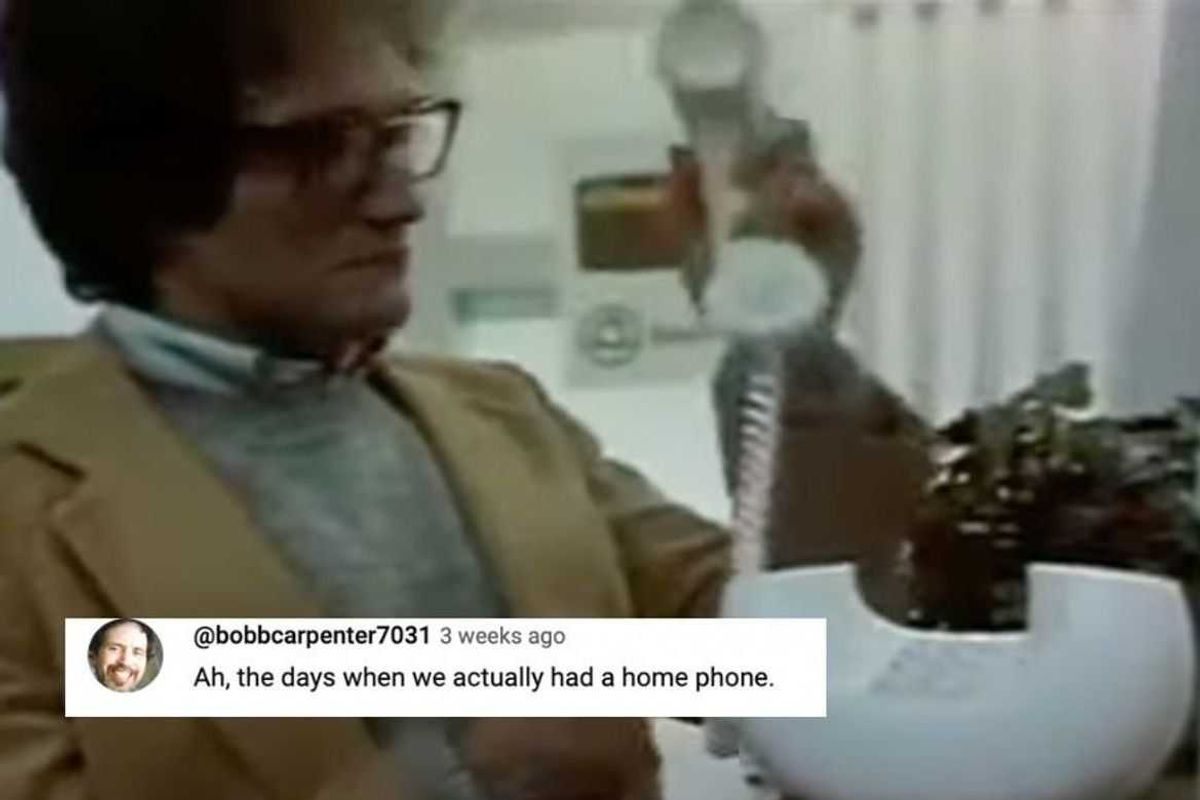Robin Williams being ridiculous in a 1977 phone commercial is a timeless delight
The nostalgia we always need.
Nobody could jazz up a run-of-the-mill phone commercial quite like him.
We all know and love the late, great Robin Williams for his work in movies, television shows, Saturday Night Live, and standup. But let’s not forget he also has a slew of commercials under his belt as well. The talented Williams delighted in everything he did because, honestly, what medium wouldn’t benefit from his signature charm and humor?
With such a long and illustrious career, fans may be happy to know that there's still new (to us!) William's content to find and enjoy. The evidence? Even the biggest Robin Williams fans might be surprised to find this recently unearthed commercial he did for the Illinois Bell phone company (later known as AT&T) back in 1977.
In the clip, where Williams unsurprisingly plays a mischievous husband making voices while his wife shops around for the perfect landline phone, we see a delightful foreshadowing of his alien character Mork from the sitcom Mork & Mindy—it certainly helps that the woman playing his wife resembles Pam Dawber, who played Mindy in the show. (Not to mention the fact that he says "people of Earth” with that perfect alien voice.)
Watch:
- YouTube www.youtube.com
Of course, it wasn’t just nostalgia for Williams that people felt while watching this video, but also wistfulness for a bygone era, a simpler time when something like a landline was even a thing. Here’s a small smattering of comments from YouTube:
“You bought a phone and it sat on a desk or hung on the wall for decades and did its job, no updates, no 'starting it up', it was always on and always worked.”
“Miss the days when you could slam the phone.”
“The most surprising thing is that they repaired the broken phones rather than simply throwing them out and giving you a new one.”
“Oh, the times when we could make ourselves unavailable.”
“I remember having to go to the phone company. All the different color phones on display.”
“Our yellow kitchen wall phone had a cord like 12 ft long. It got knotted and tangled once and just stayed that way forever.”
“I remember being so excited about the new "push buttons" instead of the rotary dial.”
And last but not least, “I want to live in this time period.”
While we have two things to miss because of this video, it also, as one view put it, gave us “something to smile about,” and that’s never a bad thing.
If you're wanting more of Williams and his special brand of humor, you're in luck. Thanks to the Internet, we have a few more archived Robin Williams commercials at our disposal, arguably more chaotic than the one for Illinois Bell.
Here's one for the popular game, Legend of Zelda:
- YouTube www.youtube.com
And another for Snickers, because who portrays the unhinged quite like Williams?
- YouTube www.youtube.com
The man simply had a talent that hasn't been matched since.
Especially this rather notorious one, in which Williams drives director Howard Storm insane with his shotgun style improv skills.
Williams’ comedic genius continues to be something we marvel at, and its inexplicable blend of zaniness, tragedy, and existentialism will always be a mystery we can never fully solve. That’s part of what made it so magical, and why we can watch even one of his most seemingly insignificant works and still be mesmerized. He was one of the greats, no doubt about it.
And yet, Williams was every bit as known for his compassion and generosity, as well as a profound sensitivity and world weariness. In an interview on The View, actor Josh Charles, who worked with Williams on the 1989 film Dead Poets Society, recalled that "he was really kind to all of us. He was obviously the big star but he was very respectful of knowing that he was one part of this ensemble and was very gracious about that and treated us all really well."
"And I could see his humor," Charles continued. "But I could also see the human behind it and the toll that took on him, even at that young age. I could see it."
This article originally appeared last year. It has been updated.

